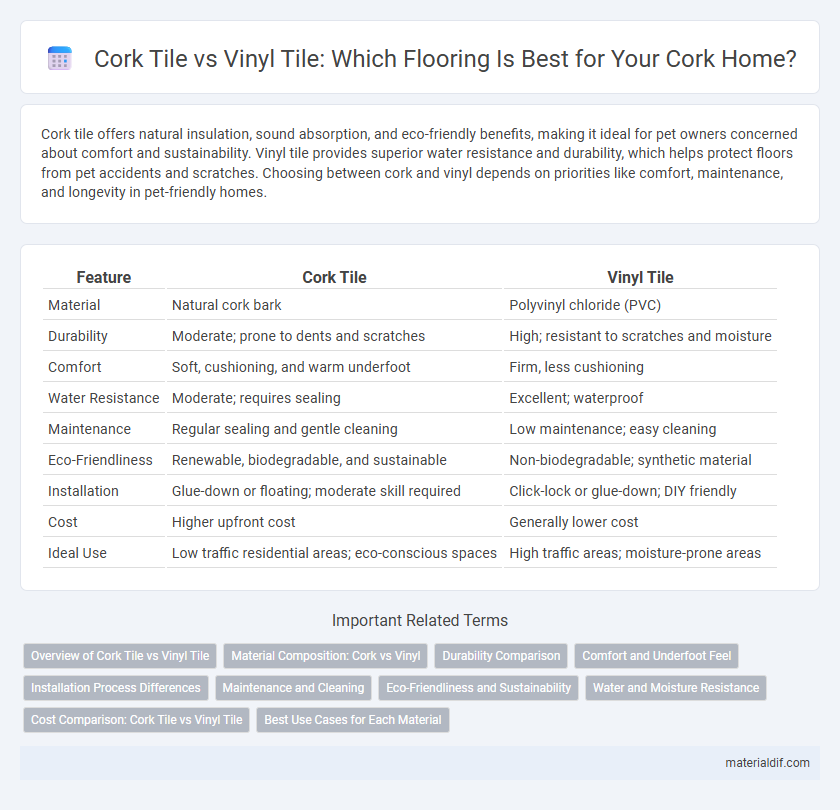Cork tile offers natural insulation, sound absorption, and eco-friendly benefits, making it ideal for pet owners concerned about comfort and sustainability. Vinyl tile provides superior water resistance and durability, which helps protect floors from pet accidents and scratches. Choosing between cork and vinyl depends on priorities like comfort, maintenance, and longevity in pet-friendly homes.
Table of Comparison
| Feature | Cork Tile | Vinyl Tile |
|---|---|---|
| Material | Natural cork bark | Polyvinyl chloride (PVC) |
| Durability | Moderate; prone to dents and scratches | High; resistant to scratches and moisture |
| Comfort | Soft, cushioning, and warm underfoot | Firm, less cushioning |
| Water Resistance | Moderate; requires sealing | Excellent; waterproof |
| Maintenance | Regular sealing and gentle cleaning | Low maintenance; easy cleaning |
| Eco-Friendliness | Renewable, biodegradable, and sustainable | Non-biodegradable; synthetic material |
| Installation | Glue-down or floating; moderate skill required | Click-lock or glue-down; DIY friendly |
| Cost | Higher upfront cost | Generally lower cost |
| Ideal Use | Low traffic residential areas; eco-conscious spaces | High traffic areas; moisture-prone areas |
Overview of Cork Tile vs Vinyl Tile
Cork tile offers natural insulation, softness underfoot, and eco-friendly properties derived from renewable cork oak bark. Vinyl tile provides durable, water-resistant surfaces with a wide range of designs and easier maintenance, making it suitable for high-traffic or moisture-prone areas. Both options vary significantly in cost, installation methods, and environmental impact, influencing suitability for different flooring projects.
Material Composition: Cork vs Vinyl
Cork tiles are made from the bark of the cork oak tree, composed primarily of natural, renewable cellulose fibers, suberin, and lignin, offering excellent insulation and cushioning properties. Vinyl tiles consist of synthetic PVC (polyvinyl chloride) layers, providing water resistance, durability, and easy maintenance but lack the natural breathability of cork. The organic structure of cork makes it environmentally friendly and hypoallergenic, while vinyl's composition allows for a wider variety of designs and superior moisture resistance.
Durability Comparison
Cork tiles offer excellent resilience with natural elasticity, making them resistant to cracking and impact damage, while vinyl tiles excel in their high resistance to water, stains, and scratches. Cork's durability benefits from its ability to self-heal minor dents and resist mold growth, whereas vinyl's synthetic composition provides superior protection against heavy foot traffic and moisture exposure. For long-term wear, cork requires proper sealing to maintain durability, whereas vinyl tiles generally require less maintenance and provide consistent durability in moisture-prone environments like kitchens and bathrooms.
Comfort and Underfoot Feel
Cork tile offers superior comfort and a warm underfoot feel due to its natural elasticity and cushioning properties, making it ideal for prolonged standing areas. Vinyl tile provides a firmer surface with less give, which may feel colder and harder underfoot but offers durability and ease of maintenance. The choice between cork and vinyl tiles greatly affects comfort levels, with cork excelling in softness and warmth while vinyl prioritizes toughness and practical wear resistance.
Installation Process Differences
Cork tile installation requires a clean, smooth subfloor and often involves glue-down methods or click-lock systems for floating floors, ensuring moisture resistance and sound insulation. Vinyl tile installation is typically more flexible, allowing direct application over various surfaces using adhesive or peel-and-stick backing, enabling faster and less labor-intensive setups. Both materials demand precise subfloor preparation but cork tiles need acclimatization to humidity levels before installation for optimal performance.
Maintenance and Cleaning
Cork tiles require gentle cleaning with a damp mop and pH-neutral cleaners to maintain their natural texture and extend durability, while avoiding excessive water that can cause swelling. Vinyl tiles offer a more resilient surface that withstands frequent wet mopping and stronger cleaning agents without damage, making them ideal for high-traffic areas. Regular sealing of cork tiles enhances resistance to stains and moisture, whereas vinyl tiles need less maintenance due to their inherent water-resistant properties.
Eco-Friendliness and Sustainability
Cork tile offers superior eco-friendliness compared to vinyl tile due to its renewable cork oak sourcing and biodegradable qualities. Vinyl tile, made from synthetic PVC, contributes to environmental pollution and is less sustainable because it relies on fossil fuels and produces non-biodegradable waste. Cork's natural insulation and durability further enhance its sustainability profile by reducing energy consumption and extending flooring life.
Water and Moisture Resistance
Cork tiles offer natural water resistance due to their cellular structure but can absorb moisture if not properly sealed, leading to potential damage over time in high-moisture environments. Vinyl tiles provide superior water and moisture resistance, making them ideal for areas like bathrooms and kitchens where exposure to water is frequent. Choosing vinyl tile ensures durability and easy maintenance in moisture-prone spaces, while cork requires regular sealing to maintain its water-resistant properties.
Cost Comparison: Cork Tile vs Vinyl Tile
Cork tile typically costs between $3 and $8 per square foot, making it more expensive upfront than vinyl tile, which ranges from $1 to $5 per square foot. Installation expenses for cork are higher due to its thickness and required underlayment, whereas vinyl offers easier and cheaper installation options. While cork demands more initial investment, its natural insulation and durability can reduce long-term costs compared to vinyl's shorter lifespan.
Best Use Cases for Each Material
Cork tiles excel in sound insulation and thermal comfort, making them ideal for bedrooms, living rooms, and play areas where warmth and noise reduction are priorities. Vinyl tiles offer superior water resistance and durability, suited for high-moisture environments such as kitchens, bathrooms, and commercial spaces with heavy foot traffic. Choosing between cork and vinyl tiles depends on factors like moisture exposure, insulation needs, and maintenance preferences.
Cork tile vs Vinyl tile Infographic

 materialdif.com
materialdif.com